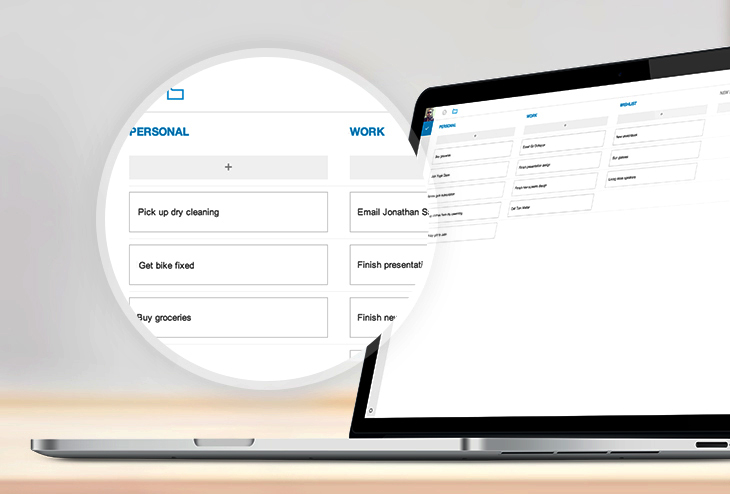
Finally! Task and todo list manager Any.Do gains a web app
Today is a day of celebration for fans of Any.Do -- the todo list and task manager for iOS, Android and Chrome. Some four years after its inception -- and after many, many demands from the service's user base -- Any.Do has, at long, long last, gained a web app. Founders Omer Perchik, Yoni Lindenfeld, and Itay Kahana have successfully avoided a brouhaha from users by finally delivering what they describe as "the number one most requested feature by our users".
Any.Do has proved incredibly successful on mobile platforms -- as well as in Google's web browser -- amassing more than 10 million users. Perchik says: "Web is a huge market we haven't even touched yet. There's a world of people who haven't considered us because they need a full web experience, right on their computer screens" of the launch. "We're conquering mobile, now it's time to break out in a broader market".

Chrome 35 adds developer-friendly tools, switches Linux build to Aura UI
Google has unveiled Chrome 35 FINAL for Windows, Mac and Linux. After the relative excitement of version 34, version 35 contains little of note for the end user to get excited about.
Developers, however, will be pleased to see a number of new and improved features implemented, including the ability to take more control over touch input. There’s also an undocumented switch to the Aura user interface on the Linux platform.

Protect your privacy with Self-Destructing Cookies for Firefox
Self-Destructing Cookies is a Firefox add-on which does a great job of controlling cookie use, without any of the complexity you’ll see in other tools.
Install the add-on and it takes immediate effect, automatically deleting a site’s regular cookies -- and its LocalStorage data -- just as soon as you close its tab.

Google, somehow, gains 100% rating for protecting user data
It may seem as though Google feels the sharp end of many tongues -- be it about problems with Glass, for shaping the content of the internet, or the way it handles advertising. But more often than not, the big G finds itself on the receiving end of criticism for being in bed with the NSA for the way it handles user privacy. In spite of all of the ammunition unleashed in Google's direction, the company has -- incredibly -- been awarded a full six stars out of six by the Electronic Frontier Foundation for protecting user data from government requests.
The EFF's Who Has Your Back? report ranks and rates the performance of some of the biggest names in the world of tech for handling user privacy in the face of government data requests. Finding ourselves in a world now tainted by the activities of the NSA, privacy and accountability have become more important to internet users than ever before. The Electronic Frontier Foundation prides itself on "defending your rights in the digital world", and its annual report looks at the performance and promises of 26 companies who handle your data.

Is AdBlock Plus killing the web? Massive memory usage is dragging Firefox down
As something of a browser butterfly, I like to keep an eye on what's happening with browsers other than the one I'm currently using fulltime. Like many tech journalists (and non-journalists for that matter), I gave up on Internet Explorer quite some time ago, opting for Firefox initially. I also dabbled with Opera and Waterfox, amongst others, but for a number of years it was Firefox that delivered web pages to me. Sadly, I noticed that things started to slow down. New versions were more bloated and sluggish, and in the search for better performance, I ended up with Chrome. I've been a Chrome user for years now, but I was recently spurred into trying out Firefox once again.
Quite where the impetus came from, I'm not sure -- just one of those "let’s see if anything's changed" moments, I guess. Apart from little quirks like the refresh button being on the "wrong" side of the program window, Firefox seems pretty decent. I was impressed by the sharpness of the display for starters -- I had forgotten that Chrome handles high DPIs very poorly. As I'm using a Surface Pro running at 1920 x 1080, running at 150 percent DPI scaling is essential (I don’t have microscopes for eyes!) and Chrome makes everything look slightly blurry... not enough to put me off -- I'm still using it, after all -- but Firefox was a revelation!

Opera Developer adds support for unprefixed CSS transforms, fails to ignite user imagination
Opera has unveiled Opera Developer 23.0, a brand new version of the alpha build of its web browser. Version 23.0 contains little in the way of eye-catching headlines, but has been used to showcase the browser’s new flexibility with regards to web standards.
Its headline feature is support for "unprefixed CSS Transforms", which accompanies another update to the underlying rendering engine.

Privacy victory: Google told that people have a 'right to be forgotten' online
If you Google yourself, do you stumble across information you would rather wasn't online? Those naked photos of you cavorting in the garden or a snippet from a drunken rant in an online forum could be sitting there for all to see. The page in question may have gone, but that's not to say that you won’t still appear in Google search results.
Obviously there are situations in which this could be detrimental to your reputation, and it's understandable that you might want something done about it. Following a case presided over by the European Union Court of Justice in Luxembourg, judges have ruled that, in certain circumstances, people may ask a search operator to remove data about them from search results.

Ads in your browser? Sponsored landing pages could appear in Mozilla
Using the internet and being subjected to advertising very much go hand in hand. Sites have server bills to pay as well as other costs, and this is offset by displaying ads as a means of generating income. This is something we're all used to, and it's generally accepted as the price we have to pay. With the spread of mobile apps, the notion of advertisements within software becomes more and more popular, but, while not entirely unknown, it's not a notion that really translated to the desktop. This could be set to change if Mozilla's experiments with in-browser advertising come to fruition.
Of course, referring to it as advertising would be a little off-putting, so the word 'sponsored' is being thrown around in its place. What's all this about? Well, back in February Mozilla's Head of Content Services, Darren Herman, posted a blog entry outlining the company's 'Directory Tiles' idea. What this amounted to was a suggestion that in future versions of Firefox, the new tab page could feature "sponsored content from hand-picked partners" as well as links to site based on location. Herman gave the reassurance that "sponsored tiles will be clearly labelled as such" but, ultimately, it still amounts to in-browser advertising.

6 tips to increase company security post-Heartbleed from LastPass CEO, Joe Siegrist
Heartbleed was a security nightmare that caught the technology world unaware and unprepared. There was a good deal of panicking in the immediate aftermath, but looking back a month down the line there is a lot to learn from what happened. But perhaps the most important thing is what happens moving forward.
Post-Heartbleed, Joe Siegrist, CEO for LastPass has a series of tips for companies to help protect data and improve privacy.

Microsoft, McAfee and more join forces to promote security with World Password Day
Security is fun! Security is sexy! In fact, passwords get so many hearts pounding that World Password Day had to be dreamed up just to create an outlet for the outpouring of emotion associated with them. This may be stretching things a little, but today really is World Password Day, a global movement involving McAfee, Microsoft, Dell, Acer, Lenovo and numerous other big names to educate the world about... passwords! I jest a little, but this is a day with a serious message -- we are all incredibly reliant on passwords, but too many of them are just not strong enough.
Head on over to the website and you'll find all manner of tools designed to stress the importance of strong passwords, and to promote good practices. Things get off to a fairly gentle start with a typing game in which you're invited to type common passwords and blast them out of the sky. There are also tools and tips from each of the companies involved in the project. Microsoft has a password checker that will test the strength of your password, McAfee (now nothing to do with John McAfee!) has a Heartbleed vulnerability checker, while Dell has the handy tip that one shouldn’t type one's password into the username field.

Emails suggest that Google was a willing partner with the NSA
Dear old Google. Dear, dear old Google. In the fallout from the NSA revelations, the company has been falling over itself to try to appear open and transparent about the relationship it had with the security agency during its surveillance program. But a series of emails dating back to 2012, obtained by Al Jazeera America, show that things were rather different than the picture that has been painted thus far. Google -- and other web companies who have, for whatever reason, cooperated with the NSA -- has made it seem as though they were unwillingly forced into taking part in NSA activities, but things may not be quite what they seemed.
Recently, a NSA lawyer made it clear that Microsoft, Google, Yahoo and others were fully aware of the levels of data collection that were being performed. This flies in the face of the earlier claims that these firms were completely ignorant of what was happening. You might have thought that such mass surveillance would be illegal, but no, this was absolutely fine according to a federal judge.

Google-Intel Chrome OS event
In San Francisco, Google and Intel kick off a special event for Chrome OS, which I assert is come of age with the matchup. Ahead of the 1 pm Eastern start time, Lenovo announced new Chromebooks and Google unveiled "Classroom", preview of a new education app.
Unquestionably, Chrome OS-devices are primed for the education market, and many of the newest Chromebooks are directly marketed for schools, students, or teachers. Dell jumped ahead of today's event touting Chromebook 11 adoption in schools.

Opera 21 adds hardware acceleration, supports full address bar URL
Opera has released Opera 21 FINAL, a major new release of its web browser for Windows and Mac. The notable change in version 21 affects the Windows build only, and sees the browser switch to Aura technology.
Aura provides a hardware-accelerated rendering of the browser, and the Opera development team has concentrated on ensuring it works properly with Opera 21.

Do Not Track: Stop using Yahoo if you're concerned about privacy
It has been mentioned here and there, but to be honest I am very surprised that more of a stink has not been kicked up about Yahoo's announcement last week. Quietly slipped into a blog post by the slightly ironically named Yahoo Privacy Team, the web firm announced that "Do Not Track settings will no longer be enabled on Yahoo". Yep, sod privacy, Yahoo is more concerned with delivering "A Personalized Experience" -- Yahoo's capitalization, not mine.
Do Not Track has been around for a few years now -- interestingly, Yahoo was one of the first companies to start using it -- and it makes it possible for users to prevent websites from monitoring their online activities. It's a feature that is supported by a number of browsers, either as a built in option, or one that can be added through the use of an extension, and it is something that has been welcomed by privacy groups all over the world.
Ditch the Firefox Australis look with Classic Theme Restorer
Hi, my name’s Nick and I like the new Firefox Australis user interface. There, I’ve said it. However, it seems an awful lot of you hate the new look unveiled in Firefox 29, which is why you’ll want to install the Classic Theme Restorer 1.1.8 add-on immediately.
As its title suggests, Classic Theme Restorer pretty much dumps everything Australis introduces, except the new menu accessible via the hamburger-like button on the main Firefox toolbar. In its place is the Firefox you know and love, complete with Firefox button in Windows.
